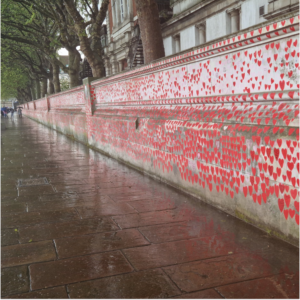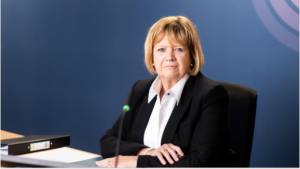17-year-old Jinn Ong explains the inquiry into the UK’s handling of COVID-19

Created in 2021, the National Covid Memorial Wall in London is a visual representation of the UK's 227,000 deaths to Covid-19.
November 17, 2023
Seven things you need to know about the UK Covid inquiry
The COVID-19 inquiry has become the focal point of current affairs in the UK.
It has brought to light various controversial issues such as WhatsApp messages sent by the members of Boris Johnson’s cabinet, accusations of a ‘macho’ government culture in it, and key officials breaching rules set by the government.
This guide aims to break down the independent inquiry and answer frequently asked questions.
1. What is a public inquiry?
In the UK, a public inquiry is established to investigate a matter of public concern, from transport decisions to the mismanagement of pension funds.
Jason Beer QC, the UK’s leading authority on public inquiries argues that the main function of inquiries is to address the following three questions: 1) What happened? 2) Why did it happen and who is to blame? 3) What can be done to prevent this from happening again?
Inquiries often times begin by looking at past events through the collection of evidence, analysing documents, and examining witness testimonies. The guidance of experts are drawn upon to help the inquiry form recommendations for future events of a similar nature.
2. What is the UK Covid inquiry investigating?
Formally opened in July 2022, the inquiry aims to examine the UK’s response to the COVID-19 pandemic (in which more than 200,000 people have died) and the lessons learned are published in anticipation of future pandemics.
Despite being established and funded by the government, the inquiry is led by an independent chairperson, former appeal court judge Baroness Hallett.
The investigation has “the power to compel the production of documents and to summon witnesses to give evidence on oath.”
A person concealing a relevant document can be fined (not exceeding £1,000) and/or imprisoned for a term of up to 51 weeks. However, a public inquiry ultimately has no mechanism to hold the government to account for acting on inquiry findings.
The inquiry aims to examine thousands of documents in their “clean unredacted” form. Witness statements have been and continue to be given by key figures involved in managing the UK’s response to the pandemic, including former Prime Minister Boris Johnson, current Prime Minister Rishi Sunak and former chief adviser to Johnson, Dominic Cummings.
As part of the inquiry, witnesses are also required to disclose emails, information and pirate communications in regards to the response.
Inquiry news and progress, key dates and timetables and regular updates on the listening exercise can be found here.
3. How does the inquiry work?
Baroness Hallett, chair of the Covid inquiry, has decided to divide the inquiry’s investigation into modules, which are running consecutively.
At the moment, there are five active modules – Resilience and preparedness (1), Core UK decision-making and political governance (2), Impact of the COVID-19 pandemic on healthcare (3), Vaccines and therapeutics (4), and Procurement (5) which started on October 24 2023.
Future modules will be announced in the coming months. Each module will investigate issues across the UK as a whole, including in the devolved administrations of Scotland, Wales and Northern Ireland.
4. What have we learnt so far?
Until now, the inquiry has enacted two rounds of public hearings.
During the first round, the UK’s resilience and preparedness took a focus. Held over six weeks, evidence was provided by 69 politicians, civil servants and independent experts, including former Prime Minister David Cameron and former Health Secretaries Jeremy Hunt and Matt Hancock.
Some key topics discussed during the first round of inquiries included an analysis of the pandemic responses of other countries, with Jeremy Hunt commenting that the UK failed to learn lessons from Asian countries such as Taiwan and Korea who “did incredibly well.”
During the first round impacts of Brexit on the pandemic response were also analysed. According to documents seen by the inquiry, several ‘workstreams’ in the Department of Health related to pandemic planning were paused, or slowed as a result of other tasks being reprioritised.
Due to their work being “reprioritised” to plan for leaving the EU with no trade deal, the Pandemic Flu Readiness Board, a cross-government body, did not meet for a whole year up to November 2019.
During the second round of public hearings, which began on October 3 and is ending on December 14, key decision-making in Westminster between January 2020 and February 2022 are being examined.
Helen MacNamara, former deputy cabinet secretary, condemned the “toxic” and “macho” culture in Johnson’s cabinet, stating the “female perspective” was predominantly absent from decision-making processes.
It was also revealed that Matt Hancock believed he should decide “who should live and who should die” if NHS hospitals became overwhelmed.
WhatsApp messages from Dominic Cummings were also revealed, containing offensive descriptions of many of his former colleagues.
Another former aide to Boris Johnson, Lee Cain, stated that the pandemic was the “wrong crisis” for Johnson’s “skillset.”
5. Will the inquiry hear from children?
According to Save the Children, a UK charity, more than 14 million children have been “silenced” by the COVID-19 inquiry.
Learn more:
In the article published in August 2023, the organisation described how the UK’s leading children’s charities and child development experts have sent an inquiry to Baroness Hallet.
It detailed the urge for her to commission experts to begin recording children’s experiences of the lockdown – given the recent publication of research revealing the extent to which the social and emotional development of children have been impacted during the pandemic.
“Hearing from children is now a critical issue for the proper functioning of the Covid Inquiry and these delays have gone on long enough. Children are one quarter of the population and there is simply no inquiry into what happened in the UK between 2020 and 2022 without them,” stated Louise King, Director of Children’s Rights Alliance for England.
During the hearings, Jennifer Twite, a barrister providing evidence on behalf of various charities for children, called for the appointment of a cabinet minister for children with cross-departmental responsibility for driving forward the implementation of a child rights action plan.
According to the official information, one of the future modules of the inquiry will investigate the impact of the pandemic on ‘education, children and young persons’.
6. How much will the inquiry cost?
Inquiries can run up enormous bills. The UK and devolved nations spent at least £639 million on public inquiries between 1990 and 2017, according to IfG research.
An analysis by Tussell, a company monitoring government outsourcing, suggests the inquiry reached £113 million by March 2023. Large sums are being spent to digitally manage the avalanche of written evidence.
More recent reports have suggested that costs are likely to surpass those of the most expensive inquiry to date, the Saville Inquiry into Bloody Sunday, costing nearly £200 million.
7. When will the inquiry be concluded?
There is no specific timescale for how long the inquiry will last.
To ensure the inquiry’s recommendations are timely, the Chair of the UK COVID-19 Inquiry, has promised to publish regular reports. She plans to publish reports for Module 1 (Preparedness and resilience) and Module 2 (Core decision-making) during 2024.
Baroness Hallett confirmed that the inquiry is aiming to complete public hearings by the summer of 2026, although legal experts anticipate the investigation might extend until 2027.




